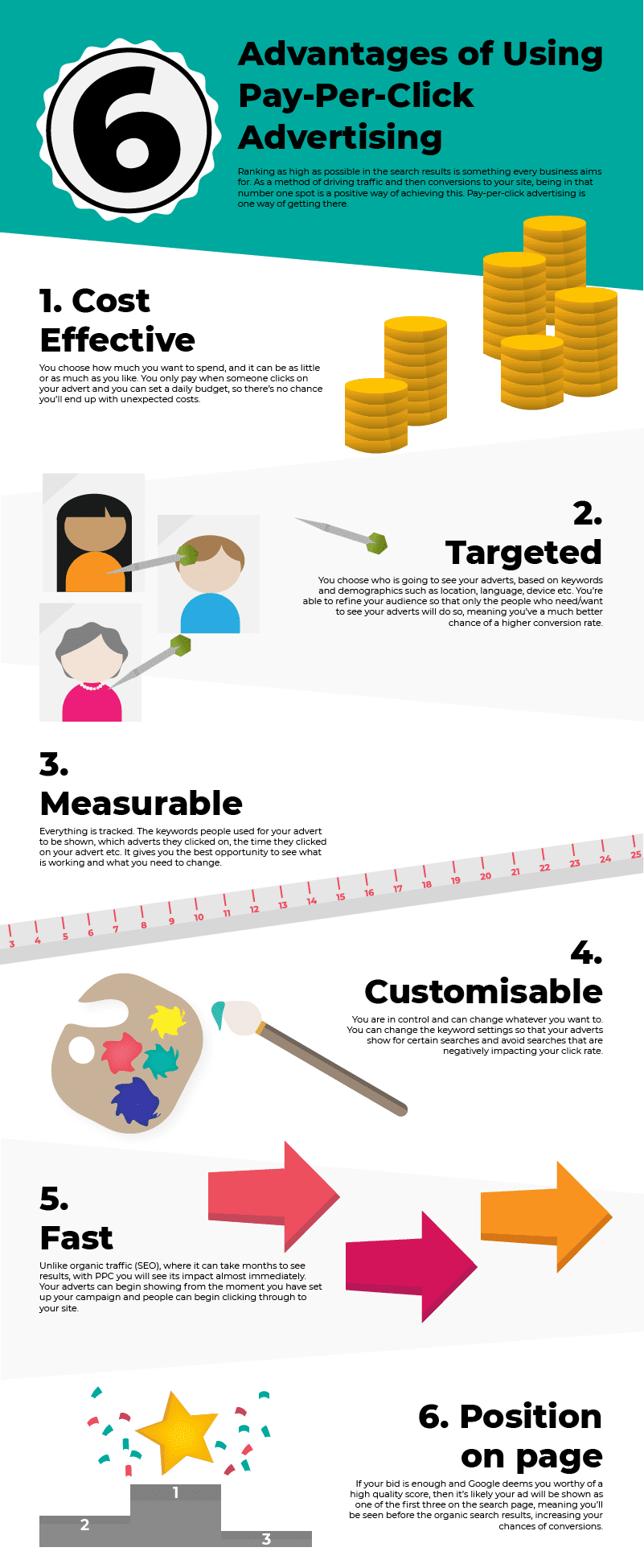PPC advertising has become a popular way for businesses to increase website traffic.
Ranking as high as possible in the search results is something every business aims for.
As a method of driving traffic and then conversions to your site, being the top-dog in that number one spot can be one way of achieving this. There are two ways to do this: PPC (pay-per-click) and SEO (search engine optimisation).
Many businesses focus most of their efforts on SEO to get to the top spot.
Whilst yes, you should be optimising your site as best you can for the search engines, it’s a process that requires a large amount of effort and time, and one that may not end up yielding the results you hope to see.
Pay-per-click advertising offers different advantages to SEO and is a solution that many overlook.
These are some of the advantages of PPC advertising…

-
Cost effective
You choose how much you want to spend and it can be as little or as much as you like.
You only pay when someone clicks on your advert and you can set a daily budget too. There’s no chance you’ll end up with any unexpected costs.
You’re also able to change how much you are wanting to spend each day at any point. The higher your conversion rate the better.
Once you’ve refined your audience you should notice that PPC is bringing about a positive ROI.
-
Targeted
You choose who is going to see your adverts, based on demographics such as location, language, device etc. You’re able to refine your audience so that only the people who need/want to see your adverts will do so.
Choose the keywords that are associated with your product/service and what you think people will be searching for in order to find it.
All this will give you a much better chance of a higher conversion rate.
-
Measurable
Everything is tracked. The keywords people used for your advert to be shown, which adverts they clicked on, the time they clicked on your advert etc.
It gives you the best opportunity to see what is working and what you need to change. All the data is produced for you on Google Ads and is simple to navigate through.
-
Customisable
You are in control and can change whatever you want to.
Say you notice that most of your clicks come around 6-7 o’clock in the evening and there’s almost nothing during the early hours of the morning. You can tell Google to be more aggressive with your ad spend.
Customise your ads so they only show in an evening and don’t show your adverts during the night.
You can change the keyword settings so that your adverts show for certain searches and avoid searches that are negatively impacting your click through rate.
-
Fast
Unlike organic traffic (SEO), where it can take months to see results, with PPC you will see its impact almost immediately. Your adverts can begin showing from the moment you have set up your campaign and people can begin clicking through to your site immediately.
-
Page position
The best ad positions are the top three. You can get your ads to these positions if your bid is high enough and you have a high quality score.
Your chances of conversions increase as you are seen before the organic search results.
It’s likely that you’ll start to notice a change very quickly after you begin to use Google Ads. It will be a little longer before you know exactly what works for you and what doesn’t though.
Monitoring your account and the campaigns you’re running is the best to figure it out. The more you know about the habits of those clicking on your adverts, the more you’re able to tailor your ad campaigns to make them as efficient as possible.
Do this and you’ll begin achieving a positive ROI.
PPC is a proven strategy for advertising your business and with the wide range of capabilities on Google Ads, for most it is a wise decision to implement this as part of a marketing strategy.
If you need any assistance starting Ads or would like someone to build and maintain your campaigns, fill out a contact form below.
Alternatively, take a look at our PPC service page for further information.


